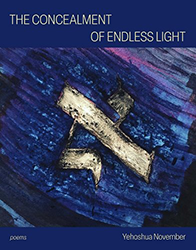Yehoshua November’s second poetry book, Two Worlds Exist, opens with a title poem that borrows ideas from the Jewish mystics to explain the presence of suffering in this world. The explanation is that “two worlds exist,” that is, what one views as pain is a misinterpretation of good descending from a higher reality. But what makes this poem exceptional is how its three sections pair esoteric Kabbalistic ideas with mundane anecdotes from the poet’s life, making the case that the emotional, spiritual, practical, and ritualistic — all different “worlds” — exist, layered one on top of the other, constantly battling for supremacy.
The duality of the intensely spiritual with the equally intense quotidian is a trademark of November’s writing. His first book, God’s Optimism—a finalist for the 2010 LA Times Book Prize — thrived on capturing such moments of the elevated in the everyday; a crying man transforming a street with his tears, a worker climbing a ladder as a nearby quorum spiritually ascends in prayer, and the sixth rebbe of the Lubavitch dynasty lightly asking for directions in one breath and darkly predicting the date and method of a man’s death in the next.
But whereas God’s Optimism steeped its contrast in this world/that world poems built largely around November’s romantic life, Two Worlds Exist digs more into his familial life, with only the rare poem revisiting romance (see the lovely “Between Lifetimes”). November’s poems are still largely concerned with, to borrow a phrase from his first book, a “Semitic sadness.” This Semitic sadness is a weighted sense of mourning over matters of interest largely to an observant Jew. It’s the feeling of heaviness that settles when tragedy strikes a family and the rabbi’s explanation is, “Perhaps you are not as religious as you should be” (“Conjoined Twins”). It’s the cancellation of a pre-prayer mysticism class after a student behaves rashly upon learning of his parent’s impending divorce (“2AM, and the Rabbinical Students Stand in Their Bathrobes”). And it’s the slow burning realization of a rock musician abandoning his profession to take a job teaching at a local Jewish school, only to find the itch of his previous life intact (“One of the Few Jews”).
Perhaps this Semitic sadness is best teased out in “Self Portrait,” the book’s last poem, which is the longest in the collection. November employs the second person point of view to paint what is essentially “a day in the life,” following him as he awakens to a child crawling into his bed, stumbles out to morning prayers, drives to his job teaching poetry, munches on cucumbers, and returns home. Sprinkled throughout are moments of longing for the second, higher world that November so badly wants to believe exists: it’s hovering above November as he listens to a lecture in the car on God’s hidden nature and it’s at the center of a discussion with a study partner about how God’s concealment in this world “is not real.”
The poem ends simply and wonderfully with the poet walking through this maze of the sacred-in-the-mundane to notice a single light burning from the otherwise dark exterior of his home. This appears to be enough to put the weight of the Semitic sadness to rest, if only temporarily. Two Worlds Exist is flushed with similar moments of light piercing the veil of darkness covering what November would view as this lower of two worlds.




